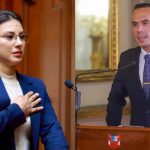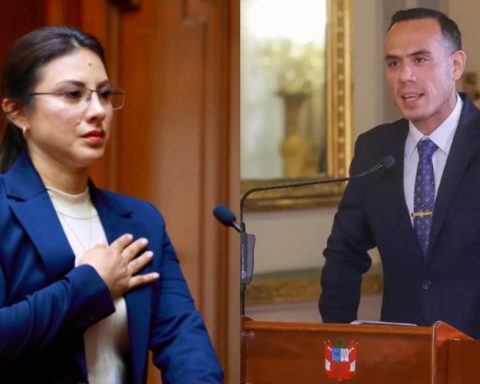The first to condition the viability of the Government’s structural reforms to the victory of the Approval in the exit plebiscite on September 4, was the head of the General Secretariat of the Presidency (Segpres), Giorgio Jackson, who maintained –in an interview granted to TVN– that “there are things in our program that see an impediment, a certain obstacle in the current Constitution.” As an example, the minister was emphatic in pointing out that, without a new Magna Carta, the health system reform could not be implemented. Statements that were supported by President Gabriel Boric himself, who, before starting his tour of Canada and the United States, pointed out that “what Minister Jackson says is something that is clearly evident.”
Who went further, in her attempt to support the strategy deployed by her Segpres counterpart, was the spokesperson minister, Camila Vallejo, who responded to the voices that question that the government program is sustained in a hypothetical scenario, such as a new Constitution. “Indeed, the government program and its depth also depend to a great extent on what happens on September 4. Without prejudice to that, and the President of the Republic has indicated this, we are going to continue working the next day, because our Government continues and we have to continue pushing, whatever it may be, the commitments that we have established with the people of our country. Vallejo said.
A speech that on the right is read as an interventionist practice and that, in his opinion, does nothing more than expose the existing difficulties in the ruling party to achieve consensus that will allow it to advance in the implementation of its program. In this regard, the former president of RN, Mario Desbordes, said that “these statements are exactly contrary to what the Comptroller proposes, because this is open interventionism, where they seek to blackmail Chileans with the fact that, if they do not approves the new Constitution, there are no reforms, which is false, contrary to the instructions for disregard, and effectively demonstrates that the Government has problems in its legislative agenda, where they have sent very few projects”.
In that sense, Desbordes added that “the main problems have been within his own coalition, where the number one opposition in Congress today is the Republicans and the Communist Party. So, the truth is that the Government has no votes, but he takes advantage of the situation for a kind of extortion of the citizenry with this message that, without a Constitution, the reforms cannot be carried out. I think the main problem is that there are two governing coalitions, so there is no coordination between the government program of the first round with the second round, where they are trying to agree on what to move forward, with reforms that are not agreed upon – from the PPD to the Broad Front – and that is also another reason why it has taken so long to enter them.”
It is then a strategy that, according to analysts, is consistent with the origin and the transforming sense of a Government that has no other alternative than to link its program with the content of a new Fundamental Charter that its sector promoted. However, parties from his own coalition –both Democratic Socialism and Approve Dignity– expressed their disagreement in mixing both discussions at this time, assuming that the reforms must be carried out regardless of the outcome of the exit plebiscite, and that, Beyond the obstacles of the current Constitution, the main limitation to making structural changes is related to the fact that they do not have the necessary majorities in Congress.
In this regard, from Approve Dignidad, the vice president of the Social Green Regionalist Federation (FRVS), Flavia Torrealba, expressed her critical view of the speech deployed by the aforementioned Secretaries of State, revealing differences of opinion within the ruling party. “I believe that it is a mistake by Minister Jackson to have linked the success of the Government to the constituent process, because they are political spaces that are clearly differentiated. When we bet on a presidential candidate and an electoral process, we bet with the tools of politics and not chance. It is not possible to link the destiny of a country to the positive or negative result of a process that cannot be controlled. You cannot bet that the plebiscite will determine the success of the Government, and it seems to me to be a mistake, where, regardless of the result in September, I believe that the Government has to continue doing its homework and carry out the reforms in the terms in which we We are committed to citizenship.
From the Radical Party (Democratic Socialism) they shared the thesis that it is a mistake to mix the government program with the constituent process, since they believe that they are different things, and that the main purpose of the ruling forces should be to promote political dialogue with the opposition and other sectors that are not part of the Government, because they believe that it is the only way to advance the reforms, beyond the result of the plebiscite.
The urgent search for agreements
Analysts agree that the discourse displayed by La Moneda is related to what was previously called the accumulation of forces, and that is related to the search for support for the realization of his political purposes, which began to gain strength in the Public Account of President Boric last week. In the opinion of the director of the School of Government and Communications of the Central University, Marco Moreno, basically what the Executive seeks is to improve its negotiating position, creating a design where a more direct link with the constituent process is favorable.
Moreno adds that “the point is that, when this is analyzed, in reality, the question is whether the Government had another possible path, and the answer is no. From the beginning it was very difficult for the Executive to separate the waters from the constituent process, since those who are governing today were at the base of what this process was, where Boric was one of the faces behind the November 15 Agreement. The challenge from now on is to start a strategy of seeking support, beyond his coalition, with the aim of making his project viable and, obviously, he has to move in a difficult balance, because some tell him that he cannot tie their fate to the constituent process. But did he have another alternative? It seems to me that, at the end of the day, it is somehow a self-fulfilling prophecy, where the Government has no other way than to link its own project with the constituent process, until the moment of the plebiscite.”
From Democratic Socialism, the president of the PPD, Natalia Piergentili, assumes that the approach of ministers Jackson and Vallejo was probably seen as a dichotomy “that perhaps sounded very strong”, although she considers that it is important to establish that with the current Constitution ” We reach thresholds beyond which we cannot advance. He clarifies that the projects committed by President Boric in the Public Account, such as the tax reform or the reform of the pension system, are already underway, but points out that other important aspects of the program are linked to the process by a new Magna Carta , such as the creation of a national lithium company or the implementation of the Single Health Insurance, which cannot be carried out, he maintains, with the current constitutional framework.
In the opposition, meanwhile, they consider that the government is looking for excuses not to carry out its program. This is what the helmsman of Evópoli, Luz Poblete, believes, stating that one of the great difficulties of the Boric administration is that it does not have a majority in Congress, and that it has had serious governance problems due to lack of coordination with its own coalition. , where –in his opinion– what is sought is to transfer that responsibility of governing to the results of the exit plebiscite, which he believes harms the expectations of citizens regarding the resolution of urgent problems, especially cost of living, health, security, pensions, among other matters.
For their part, inside the DC they are cautiously observing this debate and are waiting to be able to read the final text of the new Constitution in order to define their position officially. However, they consider that it is a mistake to mix the future of the government program with the exit plebiscite on September 4. The helmsman of the phalanx and mayor of La Granja, Felipe Delpin, explained that “the success of the government program does not go through having a new Constitution, where the President himself has said that it cannot be thought that this new Magna Carta is going to be like a tailored suit. This Constitution will be projected over time and, surely, there will be many governments that will have to work with it”.
“What is clear is that the Government has the obligation, beyond Approval, to be able to build those majorities in Congress and not only close with Approve Dignity. Let us remember that it does not have majorities with the parliamentarians of its base coalition, but rather It has to add new support, which is what it should do in either of the two circumstances after the plebiscite,” Delpin concluded.

















